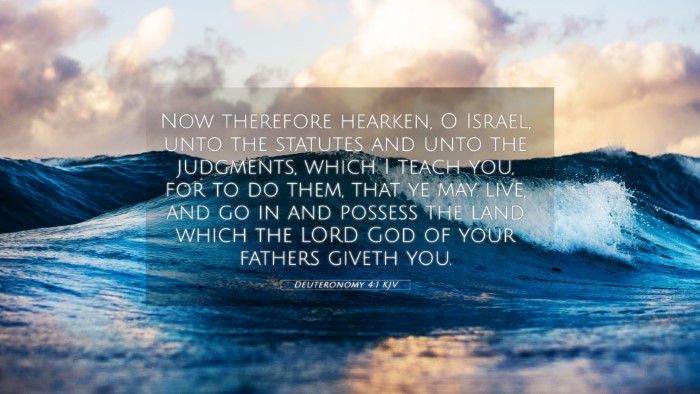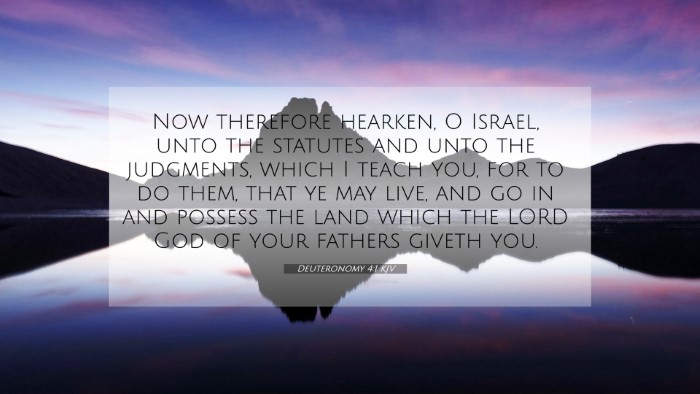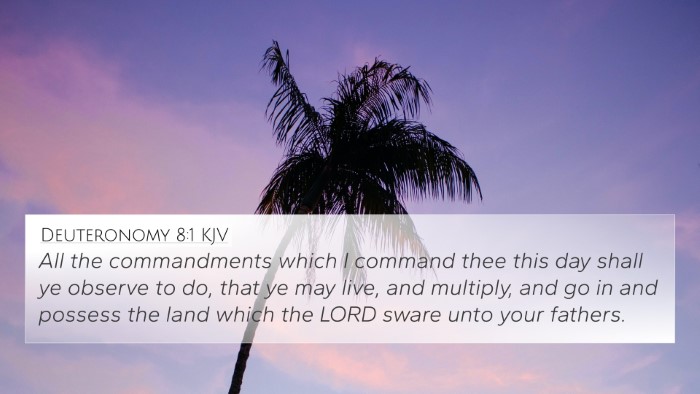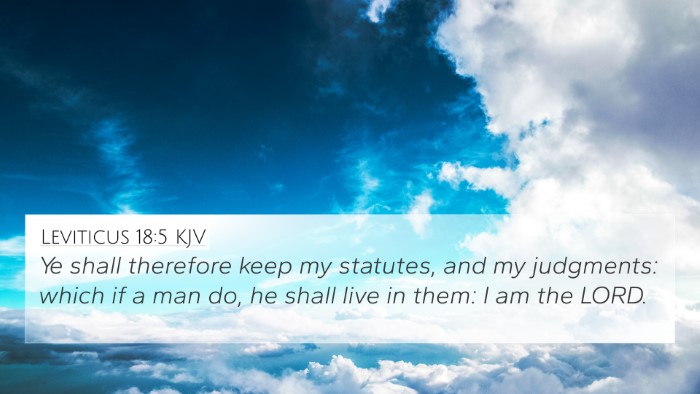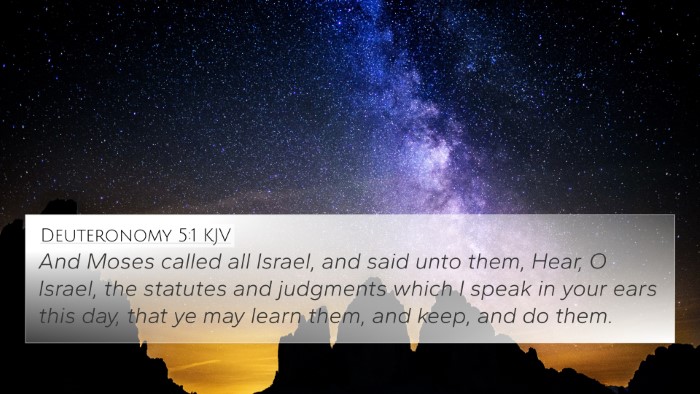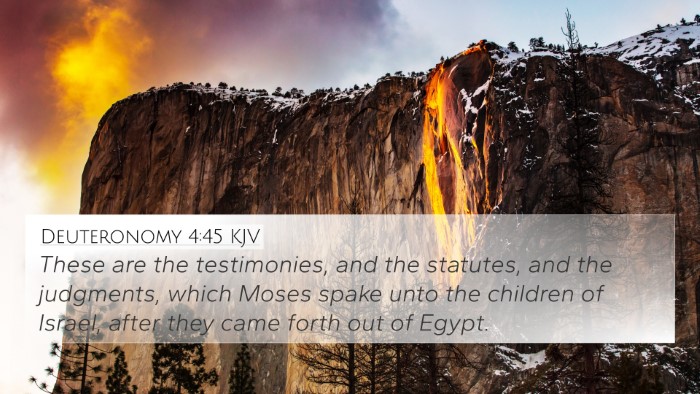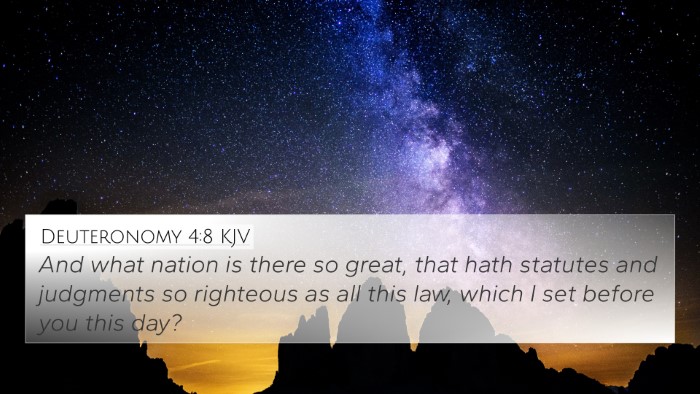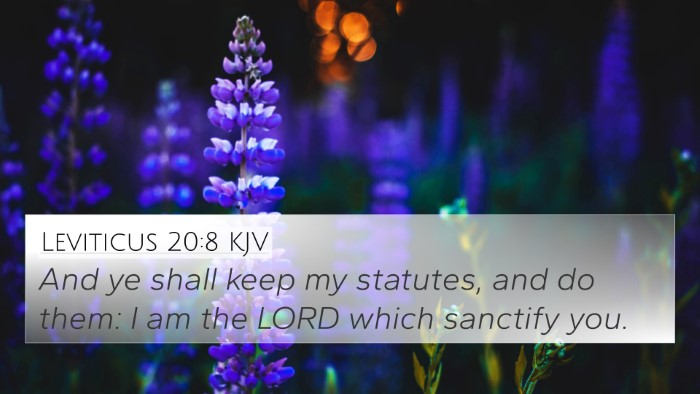Understanding Deuteronomy 4:1
Deuteronomy 4:1 states, "Now, O Israel, listen to the statutes and the judgments which I teach you to observe, that you may live and go in and possess the land which the LORD God of your fathers is giving you."
This verse serves as a critical introduction to the heart of the law that God is imparting to His people. Through a synthesis of various public domain commentaries, we can glean deeper insights into its meaning and implications for both the Israelites at that time and for contemporary readers.
Exegesis and Insights from Commentaries
Matthew Henry emphasizes the importance of listening attentively to God's commands. He points out that the act of listening signifies not only auditory reception but also the commitment to obey and implement God's statutes in daily life. This obedience leads to life in its fullest sense, indicating both temporal prosperity and eternal significance.
Adam Clarke provides a thorough exploration of the term "statutes and judgments." He explains that these laws are not mere regulations but divine principles that govern moral and spiritual conduct. Clarke further notes that these laws are essential for Israel's unique covenant relationship with God—a theme deeply rooted in the Torah's teachings.
Albert Barnes adds that the phrase “that you may live” serves as a reminder of the consequences of obedience versus disobedience. He elaborates on the transformative power of God’s Word, highlighting how adherence to God’s statutes not only secures a promised land but ensures a flourishing life built on divine wisdom.
Key Themes and Connections Between Bible Verses
Deuteronomy 4:1 encapsulates several significant themes, often resonant throughout Scripture. Below is a list of important parallels and connections that enrich the understanding of this verse:
- Exodus 19:5-6: The call to Israel to obey God’s voice and keep His covenant.
- Psalm 119:1-2: The blessings associated with those who walk in the law of the Lord.
- Matthew 22:37-40: Jesus emphasizes love for God and neighbor as the essence of the law.
- Romans 10:17: Faith comes by hearing, reinforcing the importance of listening to God.
- James 1:22: The call to be doers of the Word, echoing the importance of action behind hearing.
- 2 Timothy 3:16-17: All scripture is profitable for teaching, connecting the Old Testament laws to New Testament teachings.
- Galatians 3:24: The law as a tutor leading to Christ highlights the continuity of divine instruction.
Thematic Bible Verse Connections
The overarching theme of obedience and its vital relationship to living a full life resonates throughout Scripture. By linking Deuteronomy 4:1 to these verses, we can explore the interconnectedness of God's laws across both the Old and New Testaments. This inter-Biblical dialogue reinforces the centrality of God’s Word in guiding His people.
Tools for Bible Cross-Referencing
To further delve into the richness of Scripture and discover connections between Bible verses, various tools and methods can be employed:
- Bible Concordance: Helps locate specific verses and their occurrences throughout the Bible.
- Bible Cross-Reference Guide: A helpful resource that links similar themes and topics across scripture.
- Cross-Reference Bible Study: Techniques and approaches to systematically study the interrelations of biblical themes.
Concluding Thoughts
Deuteronomy 4:1 invites readers into a profound understanding of their relationship with God, emphasizing the necessity of listening and obeying His commandments. The insights derived from commentators like Matthew Henry, Albert Barnes, and Adam Clarke elucidate the enduring relevance of God's statutes in advancing both an individual's faith and communal living. This verse acts as a pivotal axis around which many themes of biblical faith revolve, encouraging ongoing engagement with the Scriptures.

